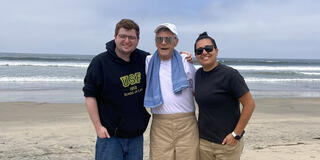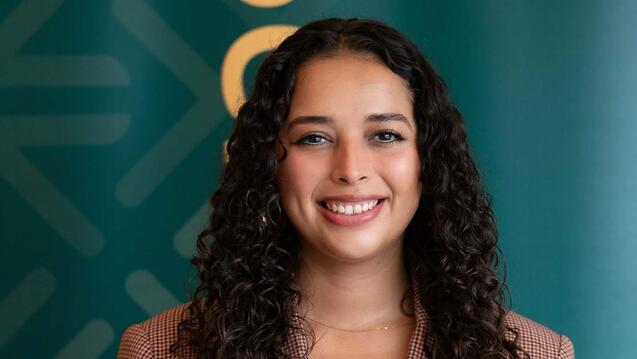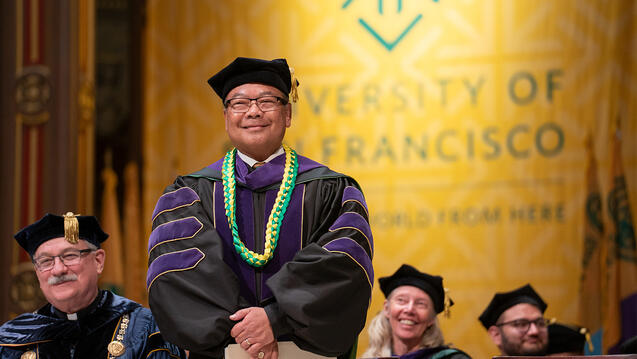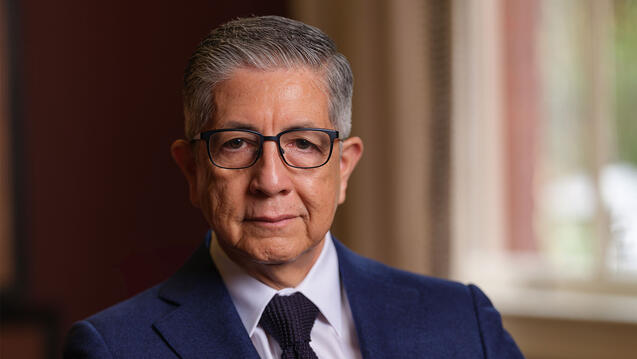Advocacy in Action

Michael “Mikey” Brust ’25 chose to pursue a JD because he wanted to rectify injustice in the criminal legal system. This past July, his singular focus paid off when Brust’s grandfather, Patrick Dunn, was released from prison after 31 years, thanks to Brust’s advocacy, the work of USF’s Racial Justice Clinic (RJC), and Professor Gabby King.
Brust never imagined that the clinic would take his grandfather’s case. Instead, Brust spent much of his time working under Professors Charlie Nelson Keever and Lara Bazelon on a wrongful conviction case in Pennsylvania. “There are a lot of people in prison who need help,” Brust said. As a student-clinician, he witnessed first-hand how the clinic receives “a ton” of mail from people in prison all over the country. Students read their submitted materials, research potential claims, and make recommendations to RJC staff attorneys. Clinic attorneys then represent clients in a variety of cases, including claims of wrongful conviction and excessive sentencing.
Pat Dunn, who maintains he was wrongfully convicted in 1993, became a clinic client due to his grandson’s tenacity. In the clinic, Brust realized that there was a legal pathway to his grandfather’s release if he had zealous advocates pushing for it. “The clinic wouldn’t have known about Pat Dunn if it were not for Mikey. Mikey is the reason that Pat is out,” according to Prof. King.
Dunn’s family and supporters have advocated for his exoneration and release for decades. Over the years, Brust and his uncle made numerous attempts, to no avail, to secure Dunn’s release. But in March 2024, they succeeded in convincing California Governor Gavin Newsom to commute Dunn’s sentence of life without parole to a sentence of life with parole. As a result, Dunn, at 87 years old, was instantly parole-eligible.
The octogenarian former school-principal has a history of strokes and suffers from advanced end-stage dementia and stage three colon cancer. Prof. King reviewed Dunn’s medical and correctional records to document his rehabilitation and medical issues. She also met with experts in palliative care, researched how dementia impacts people in correctional institutions, and demanded regular meetings with Dunn’s correctional medical care team to advocate for his release based on his rapidly deteriorating health. “There’s a fairly large number of elderly, sick people serving these life sentences,” King explained. “People who no longer pose a risk to society and, like in Pat’s case, require significant care and assistance.” Her goal, she says, was to “humanize Pat, [and] get people to care about his well being.”
King and RJC colleagues Nelson Keever and Bazelon appealed to the Governor’s Office to intervene again. In July 2024, Dunn became only the second person in California sentenced to life without parole to receive a medical reprieve from the governor, ultimately securing his release from prison. For Brust, it “felt like a miracle. My family is finally able to heal, and Pat can live the closing chapter of life that he deserves.” Reflecting on his experience as a student-clinician and Pat’s advocate, Brust says that he “learned a lot about the type of attorney I want to become. When I look at Gabby King, Charlie Nelson Keever, and Lara Bazelon, those are three professors, three attorneys, who are brilliant, fierce, and relentless in their advocacy for their clients. My family is forever grateful for their life-changing work.”


